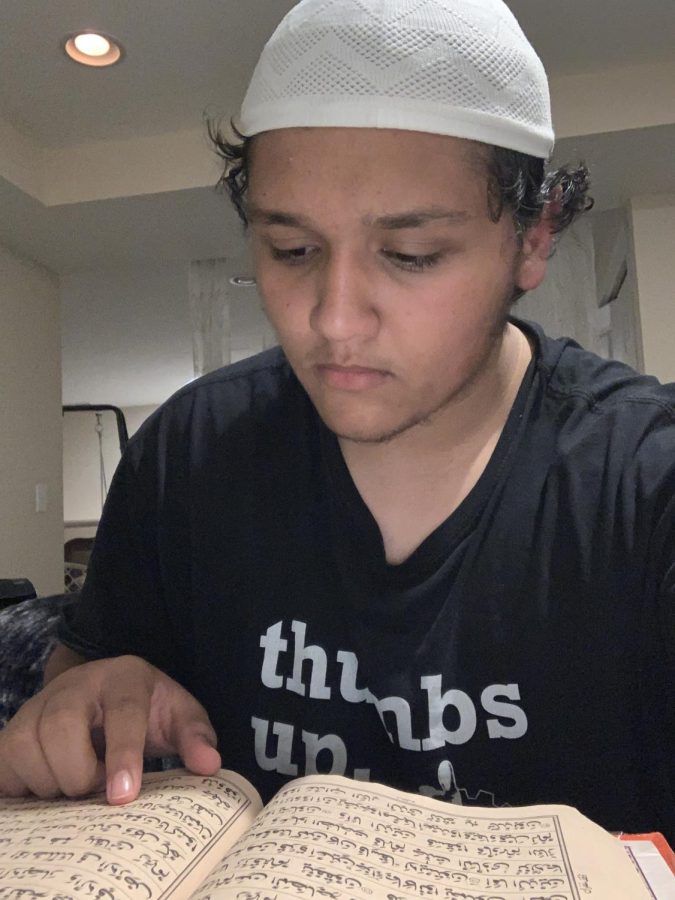Patriots in Ramadan
Muslim students talk about experiences during Ramadan
Senior Anoosh Weedy reads from his Quran after breaking his fast for the day.
While many students probably knew the date of Easter this year, the coming of another religious holiday has gone without as much knowledge.
April 2 marked the beginning of Ramadan this year, a holy month of fasting for Muslims.
Junior Haya Ahmed talked about the details of the fasting rules during the month.
“Fasting [is] for all Muslims who are physically able to, and of the age to do so as well. The sick and elderly are exempted from doing so, as well as pregnant women and children. The fasting itself lasts from the break of dawn to sunset, and in it, we are not allowed to eat anything nor drink,” Ahmed said.
For most, this is the extent of their knowledge on Ramadan. However, considering that close to 4 million people (in the United States alone) practice the Islamic religion and the month-long holiday yearly, there is much more to know about it.
Ramadan is celebrated during the ninth month of the Islamic calendar and is based on the lunar cycle. Because of such, it usually lasts 29 to 30 days, the duration of a month.
“The Islamic calendar is dependent on the phases of the moon and Muslims never know the day they will begin their month of fasting until a day or so before it actually begins. This is because we must see the moon in order to fast, and if we don’t, then we must wait another day before fasting. It’s a bit tedious, believe me, especially because it makes planning in advance difficult, but it is, nonetheless, kind of thrilling!” Ahmed said.
Ramadan has roots dating back to 624 C.E; and is practiced as the Fourth Pillar of Islam. The other Pillars include Profession of Faith, Prayer, Alms, and Pilgrimage.
Junior Umair Hussain is also currently observing Ramadan.
“It is important for me because it teaches us to be self-disciplined and feel empathy for the less fortunate,” he said.
Just like any holiday, Ramadan is celebrated differently by all people. Because Ramadan falls during the school year this year, this has changed how some are able to enjoy their time.
In order to break one’s fast before the working day, Ramadan typically begins before the sun rises.
“Before beginning the fast, Muslims eat breakfast (called “suhoor” in Arabic) before our morning prayer. Today, the time for our morning prayer (called “fajr”) was at 5:24 a.m; my family and I woke up at around five to prepare something and eat it. I pray my morning prayers and take a short nap before getting up for school (only because the time in between is over an hour and I have no interest in staying up when I could be sleeping!) The school takes up quite a bit of our time, and once I’m home at 3:00, I pray my afternoon prayers and do some homework, or read a book. Muslims break their fast at sunset, which for today was 7:32 p.m. “Breaking” a fast simply means that you say a short, six-word prayer in Arabic, and then begin eating,” Ahmed said.
Lots of activities during the day vary on one’s personal scheduling and time.
Hussain commented more on his routine during Ramadan.
“I then go home, read my afternoon prayer, and take a 1-hour nap. I then wake up and do some house chores, do my homework, and read the Quran. At 7:30 I then break my fast because the sun is setting. I then eat and pray at my mosque until 12:00 a.m.,” he said.
Alongside typical activities and prayer, while fasting during the day, some families have special traditions practiced over the years.
“So every year, during Ramadan our family watches old cartoons that we used to watch as kids during Fajr, which is the time that we get up to eat before the sunsets. It’s just something cute and fun that we do,” Abdi said.
Though Ramadan falls during the school year, it can be hard for many to imagine going on a full day of learning without eating.
“Fasting makes studying for exams a little difficult, I won’t lie. Sometimes, it’s difficult to pay attention to what it is you’re studying because you’re hungry, which is always irritating, and so sometimes I’ll have to push aside my work until after dinner so I can complete it,” Ahmed said.
However, both Hussain and Abi say they are usually able to get used to not eating and sometimes even feel more focused during this time.
However, meals during school might provide a challenge, according to Ahmed.
“Most Muslims do not like to sit during the lunch period and watch their friends eat food, so Ms. Kim and Ms. Addams (ESOL teachers) allowed us to spend our lunches in their classroom and the computer lab, where we just sit and either do homework, classwork, read, or just chat with one another. If we didn’t have this opportunity, I would’ve been sorely heartbroken– watching others eat while I can’t is kind of disappointing!” Ahmed said.
Another important part of Ramadan is praying, which is done five times throughout the day.
“I don’t pray at school, but that’s just a personal preference. But when I get home the first thing I do is make up for the prayers I missed while at school and that last for about 15 minutes (3 minutes per prayer),” Abdi said.
Because the days have lengthened due to Daylight Savings, many students can avoid praying at school.
“During the wintertime, our afternoon prayers would fall around twelve o’clock, while our third prayer of the day fell around two o’clock,” Ahmed said. “Because the former would begin and end during the school day, it was difficult to accommodate it at home, and thus, the Muslim students had to request a room so we could pray peacefully for around seven to ten minutes without disturbing others. Our teachers were all respectful of it, and often gave us the time to go, so we’d pray in a back room of the library.”
While the school has been accommodating in some aspects, many students still feel the school and teachers would do more to recognize and remain educated on Ramadan and other Muslim holidays.
Within the last few weeks, Rockwood and Mehlville School Districts have announced a day off next year for Eid al-Fitr, a holiday celebrating the end of Ramadan. This year, Eid al-Fitr will fall on May 2, which is a school day in Parkway.
“I wish that some people would realize that Ramadan isn’t something that Muslims are forced to do and isn’t a form of oppression. I wish that they would try and educate themselves or at least ask Muslims for clarification,” Abdi said.







